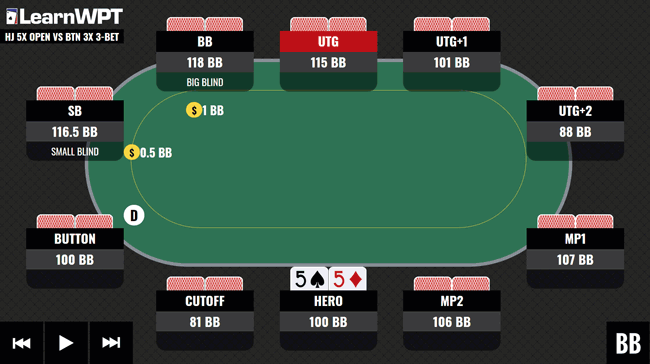WPT GTO Trainer Hands of the Week: Playing Out of Position in a 3-Bet Pot in Small Stakes

Today��s hand features a common spot from a small stakes cash game ($1-$2 binds) where an opponent plays back at our aggression in late position. In this cash game spot you are out of position against a tough opponent on the Button who 3-bet your 5BB open in the Hijack to 15BBs.
In a small stakes cash game with an opening raise to 5BBs your opening hand range is quite a bit narrower than it would be in a game with a smaller opening raise size. This Hijack range will be narrower than a normal late position first-in opening range because you will often need to risk a larger amount preflop in order to thin the field to 2 or fewer opponents in an average low stakes game.

This dynamic also results in the Button��s 3-bet response being narrower and more polarized than a default 3-betting range vs a late position open. The Button��s 3-betting range will consist mostly of very strong hands (JJ+/AK) and include a mixed strategy of suited connectors and gappers plus the hands with significant blockers (Axs/Kxs). Your range is more capped and very condensed having many pairs and suited broadway hands, although you do slowplay Aces a portion of the time in this scenario.
Against a polarized hand range as the out of position player postflop your strategy will often be to take a very passive line to keep your opponent��s range wide and allow them to bluff more frequently. In order to balance your range with this passive line be sure to include slowplaying with some big hands as well and do very little check-raising on the flop.
The biggest mistakes you can make in this scenario are giving up too often when your opponent has many bluffs in their range and playing your big hands too quickly. By doing this you split your range and make yourself more vulnerable to future bluffs from your opponent by having fewer strong hands in your check/calling range. The stack to pot ratio (SPR) is quite low in this scenario at less than 3 so hands can quickly get all-in with a few bets and one-pair is often strong enough to play for stacks.
To see more examples and test your skills, you can play through five free solved hands from this scenario.
To access the free five hands, visit this page.
Regular play on the WPT GTO Trainer will help you adjust your decisions closer and closer to GTO strategy.
You don��t have to be the world��s best player to use GTO Strategy, and thanks to the WPT GTO Trainer, now you don��t have to buy expensive software or have expert level knowledge to study GTO.
Why use the WPT GTO Trainer?
The WPT GTO Trainer lets you play real solved hands against a perfect opponent in a wide variety of postflop scenarios for cash game and tournament play.
If your goal is to be a tough poker player then you should try the WPT GTO Trainer today.
Register a free account here (it only takes your e-mail address to begin) to play hands and see true GTO strategy in real-time.
The WPT GTO Trainer has over 4 billion unique solved flops, turns and rivers that are fully playable.
As you make decisions in a hand, you receive instant feedback on the specific EV loss (if any) and Played Percentage for every action you take as compared to GTO strategy.
The full selection of scenarios for the WPT GTO Trainer are only available to members of LearnWPT, however we��re giving PokerNews Readers free access to the Trainer on a regular basis with the WPT GTO Hands of The Week.
Use this series of articles to practice the strategies you learn on LearnWPT (or at the table) and test your progress by playing a five-hand sample each week








